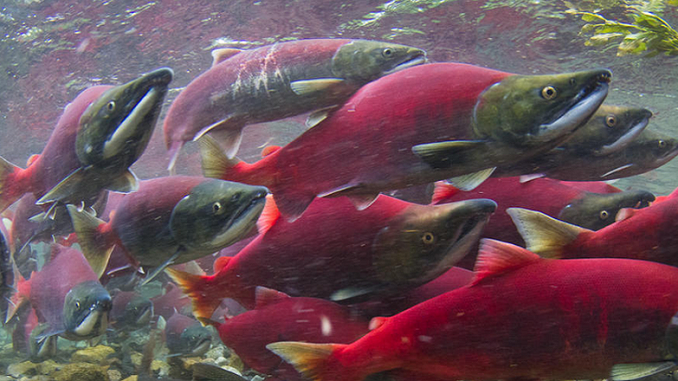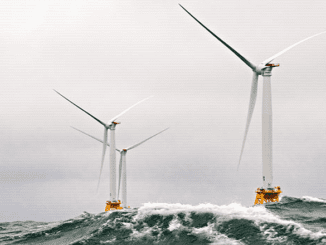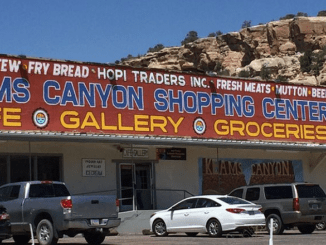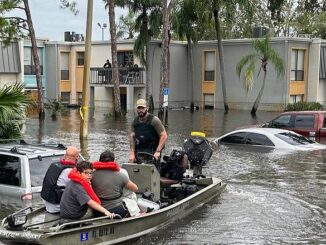
BETHEL, Alaska, October 2, 2021 (ENS) – The 56 tribal communities living in Alaska on one of the world’s largest deltas is witnessing the loss of their customary salmon run this year. But their neighbors are not letting them starve this winter.
The Yukon–Kuskokwim Delta is located on Alaska’s west coast where the Yukon and Kuskokwim rivers flow into the Bering Sea. Spanning 50,000 square miles, it is one of the largest deltas in the world.
“The Yukon River, from the mouth of the river as it empties into the Bering Sea all the way to the headwaters in Canada, is experiencing an unprecedented situation with salmon this summer,” Vivian Korthius said in August in her role as CEO of the Association of Village Council Presidents, AVCP, which represents the 56 communities.
“Throughout the whole river, including within the AVCP region, there has been no opportunity for subsistence users to catch salmon to put away for the winter, Korthius explained.
“In other parts of the State, such as the Bristol Bay Region, the salmon season has been successful,” Korthius said.
Now, Bristol Bay is donating tons of salmon to the Yukon River communities to keep them from starving this winter.
“The Bristol Bay donation of salmon to the Yukon River villages is a story about ‘neighbor helping neighbor’ during a disaster,” Korthius said gratefully.
Bristol Bay Salmon Flown to the Lower Yukon River
Through many organizations working together, king and chum salmon caught in Naknek and King Salmon in the Bristol Bay Region are being donated to the Yukon River villages.
Organizing the salmon distribution is Sea Share, a nonprofit based in Bainbridge Island, Washington, whose mission is to engage the seafood industry in a collective effort to improve nutrition for the people served by food banks. SeaShare distributes high-quality, first-run seafood that, instead of being sold in a market or restaurant, is distributed to food banks nationwide.
The idea for helping the villages on the Yukon River came from the fish processors in a meeting they had in King Salmon on July 1st.
The six Bristol Bay fish processers: Alaska General Seafoods, Leader Creek Fisheries, North Pacific Seafoods, Ocean Beauty Icicle, Silver Bay Seafoods and Trident Seafoods have worked through Sea Share for 25,000 pounds of Bristol Bay salmon to be donated to both the AVCP and the Tanana Chiefs Council regions along the Yukon River.
Sea Share is partnering with four air transportation companies: Lynden, Northern Air Cargo, Everts and Alaska Air, to fly the fish to Anchorage. From there Everts will fly half the total amount of fish to Emmonak to hand over to the Yukon Delta Fisheries Development Association for repacking to be delivered to families along the Lower Yukon River by boat.
Governor Dunleavy Lends a Hand
Alaska Governor Mike Dunleavy, a Republican, authorized $75,000 from the Alaska Department of Fish and Game to pay for additional chum salmon for the communities of Emmonak and the Yukon River.
“Alaskans are at their best when we come together to help one another,” said Dunleavy. “This collaboration between our tribal leaders, village elders, our local air businesses, seafood industry, and dedicated state workers is a show of our shared commitment to the people of the Yukon river and Emmonak.”
“Having lived in rural Alaska and raised a family in a village, I know the importance of the fishing season to keeping a family fed and healthy through a winter,” the governor said.
“Make no mistake, this does not replace the cultural importance of the fishing season,” he said. “But this joint effort between our tribal and village leaders, our local air businesses, our seafood industry, and dedicated state workers highlights the need of getting healthy, Alaskan-grown fish to our neighbors.”
Biden Begins Protecting Bristol Bay Salmon From Pebble Mine
On September 9, the Biden administration took the first step to begin the process of protecting Alaska’s Bristol Bay, which hosts the world’s largest sockeye salmon fishery.
According to the Wild Salmon Center based in Portland, Oregon, Bristol Bay is “America’s greatest salmon stronghold, home to an annual wild sockeye salmon return that surpassed 50 million in 2020. The fishery is worth $2.2 billion annually, supporting 15,000 commercial fishing jobs, subsistence foods for 31 Alaska Native Tribes, and a globally renowned trout and salmon sportfishery.”
But the fish are threatened by vast copper and gold deposits near Bristol Bay desired by mining companies.
Northern Dynasty minerals, Ltd., a mineral exploration and development company based in Vancouver, Canada, has been trying for years to get approval from the U.S. government to dig the Pebble Mine.
But runoff from the proposed mine, including hazardous chemicals such as cyanide, would threaten the near-pristine habitat of salmon and other wildlife around Bristol Bay and the rivers and lakes that flow into it, causing Trout Unlimited and other conservation groups to challenge the original EPA decision that would have permitted the mine at the headwaters of Bristol Bay.
The administration filed a motion in the U.S. District Court for Alaska to quash the Trump-era decision that had removed environmental protections for Bristol Bay and favored the establishment of the Pebble Mine.
The U.S. Environmental Protection Agency now argues that the Trump administration acted illegally in 2019 when it rejected concerns that a massive gold and copper mine would threaten the fisheries, withdrawing federal protections from Bristol Bay. If the court agrees, the Biden administration could begin writing permanent protections for Bristol Bay.
It is this court battle that is now underway in the U.S. District Court for Alaska. The Indigenous communities along the Yukon River are watching the proceedings closely.
Featured image:
© 2021, Environment News Service. All rights reserved. Content may be quoted only with proper attribution and a direct link to the original article. Full reproduction is prohibited.



